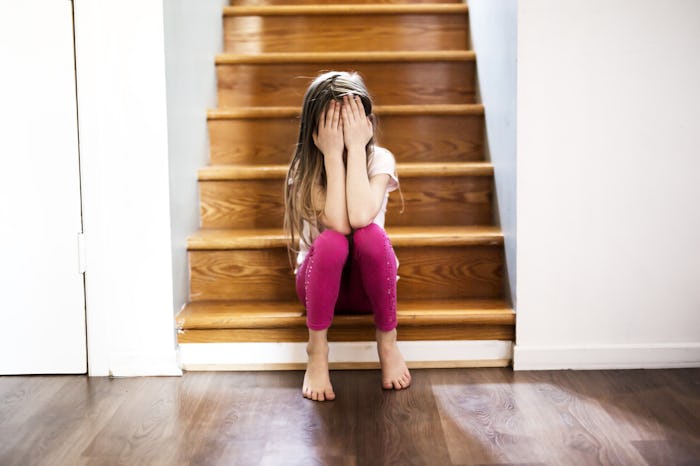Life

Here's The Best Way To Handle Your Kid Yelling That They "Hate You"
I have vivid childhood memories of stomping up the stairs, slamming my door, and yelling out the most terrible insult I could think of to my parents: "I hate you!" While most people probably uttered the same words to their mom or dad at some point, as parents, you realize that being on the other side of that coin is kind of devastating. But you're the grownup here, so unfortunately it's up to you to handle the situation well, no matter how hurt you feel. Here's what to do when your kid says they "hate" you, because it happens to everyone sooner or later.
Pediatrician Dr. Jarret Patton says that although your kids' words can certainly be hurtful, it's helpful to see them as a demonstration of the child's emotions and quest for independence rather than take it literally or too personally. "Children often say 'I hate you' in response to something they don't like. This is an attempt to change the rule, procedure, or decision," Patton tells Romper. "Although this is partly the development of negotiation, the use of potentially hurtful language signifies their passion for change and need for immediate attention."
What exactly is the development of negotiation? Patton explains, "Children have developmental stages in their negotiation with every part of their verbal reasoning. In the beginning it starts with the understanding and use of the word 'no'. Most of the time it develops into meaningful discussion of feelings and reason as they age."
So what's a mom to do with all that emerging negotiation? First and foremost, don't give in. Calmly explain your stance yet again, and hold your ground with a level head and in control of the conversation. If she continues to spew the H word, Patton recommends ignoring it. "If the phrase continues after a couple of explanations that they understand, your next best bet is to ignore it like any bad word you may hear them say. If they don't get the desired reaction from you, it won't be used anymore."
Patton believes that painful times like these can actually be great parenting opportunities, urging moms and dads to "take full advantage of that 'I hate you' moment." As hard as it can be to not let your own hurt feelings get in the way, you have to rally like grownups and, you know, be the bigger man. If you find your own anger triggered by your child's words, walk away, take a brief pause, and take yourself to your happy place (or at least count to 10).
There's a life lesson here that your kid shouldn't miss, but the conversation will vary depending on his or her age. For young children, Patton says, "The discussion can move towards love and why it's important to love each other. Love translates easily into the reason behind the rule or decision made by the parent, for instance, "it's because I love you (that I want you to be safe, healthy, etc)."
Older children have a higher capacity for critical thinking, and learning to listen to and consider viewpoints they don't like is an important part of growing up. Once the older child has calmed down, parents can turn the topic of hate into a deeper discussion on healthy ways to express feelings. Teaching children to use appropriate feeling words such as "I'm angry" or "I'm so frustrated" equips them with important interpersonal skills for the future.
And as for you, mom or dad? An early bedtime, glass of wine, and Netflix binge for you might be just what the doctor ordered.
Check out Romper's new video series, Bearing The Motherload, where disagreeing parents from different sides of an issue sit down with a mediator and talk about how to support (and not judge) each other’s parenting perspectives. New episodes air Mondays on Facebook.